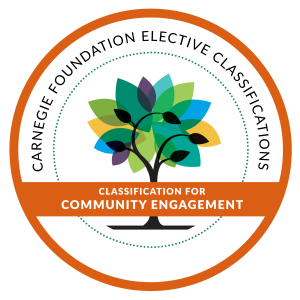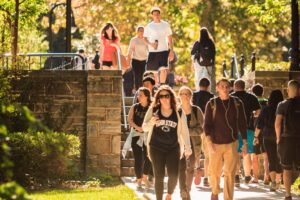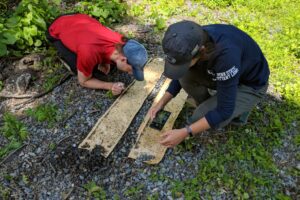Penn State Carnegie Community Engagement Classification
The office of Experiential Learning team lead Penn State University’s application and institutional self-study for the Carnegie Community Engagement Elective Classification, chaired by Michael Zeman, Director of Experiential Learning, leading a task force that included a core strategy team, with designations achieved in 2008, and most recently 2015. Engaging with over 250 voices across all campuses and many community partners, the task force collected data, critically reflected, engaged in dialogue, and implemented the institutional self-assessment to document and enhance community engagement at Penn State University.
As a modern land-grant institution, Penn State remains deeply committed to fostering meaningful relationships with communities across Pennsylvania and beyond. The 2026 Carnegie Community Engagement (CE) Reclassification application offered a critical opportunity to reflect on and elevate that commitment—highlighting how our institution integrates engagement across teaching, research, outreach, and service.
Through the 2026 application process, Penn State has reaffirmed its commitment to building trust, leveraging collective assets, and co-creating solutions that benefit all. This reclassification is not simply a designation—it is an invitation to further align our institutional mission with the evolving needs of society.
The Carnegie Foundation’s Community Engagement Classification is a prestigious national recognition that highlights Penn State’s commitment to meaningful partnerships with our communities through teaching, research, and service. This classification underscores how our engagement efforts enrich student learning, advance scholarship, and address societal challenges in mutually beneficial ways.
What is Community Engagement?
The reclassification process affirmed Penn State’s evolving definition of community engagement—one that prioritizes reciprocity, co-created solutions, and long-term impact. This institutional reflection also underscored the strategic role of community engagement in addressing pressing societal challenges through public impact research while supporting student learning and professional development.
Unlike many institutions that view community engagement as a campus-to-community effort, Penn State approaches it as a University-to-Commonwealth commitment, reflecting its unique structure. With 23 Commonwealth campuses across urban, suburban, and rural areas, Penn State delivers statewide educational access and engagement, fulfilling its land-grant mission through deep, mutual local partnerships.

What is Carnegie Community Engagement Reclassification?
What is the Carnegie Community Engagement Classification?
The Carnegie Community Engagement Classification recognizes engaged scholarship, teaching, learning and outreach. The classification is not an award. It is an elective, evidence-based documentation process for self-assessment and quality improvement purposes. The Carnegie Foundation for the Advancement of Teaching sponsors the elective classification for institutions that have made extraordinary commitments to their public purpose.
Penn State received community engagement classification in 2015, joining a select group of 367 public and private institutions in the United States. In 2024, both Behrend and Harrisburg campuses received campus-specific classification.
How does the Carnegie Foundation define community engagement?
The Carnegie Foundation provides the following definition for community engagement.
“Community engagement describes the collaboration between institutions of higher education and their larger communities (local, regional/state, national, global) for the mutually beneficial exchange of knowledge and resources in a context of partnership and reciprocity. The purpose of community engagement is the partnership of college and university knowledge and resources with those of the public and private sectors to enrich scholarship, research, and creative activity; enhance curriculum, teaching and learning; prepare educated, engaged citizens; strengthen democratic values and civic responsibility; address critical societal issues; and contribute to the public good.”
The Carnegie reclassification process
The Carnegie Foundation requires recertification of the Carnegie Community Engagement Classification on a 10-year basis and then, subsequently, every five years. In order to be reclassified, institutions must submit an application detailing how the university has expanded, deepened and integrated community engagement work into all aspects of the university.
The recertification process for Penn State began in 2023 with an application deadline of April 2025.
Why seek Carnegie reclassification?
In 2020, Penn State launched its strategic plan, One Penn State 2025, to build on its strengths as a top-ranked public university. In that plan, Penn State committed to “support our community, region, state, nation and world through mutually beneficial and impactful partnerships that reflect a firm commitment to our mission and increase the visibility and reputation of the university.” The Carnegie Community Engagement Classification reclassification process aligns well with this strategic goal.
Investment in new and improved data reporting structures will support community engagement assessment within the university’s colleges, campuses, and schools, as well as provide data for external grants, awards, and accreditations. Additionally, it will enhance existing initiatives to bolster student success. Reclassification will also demonstrate the university’s commitment to its identity and mission as a land grant university.

Looking Ahead Strategically
Based on Penn State’s 2025 Strategic Plan, particularly the goals of Enhancing Student Success and Increasing Land-Grant Impact, below are three significant ways the University can strengthen its community engagement efforts.
Integrate Community-Engaged Learning Across the Curriculum
To enhance student success, Penn State can expand opportunities for undergraduate and graduate students to participate in community-engaged learning experiences that are embedded within their academic programs. This includes creating specific program learning outcomes (PLOs) for community engagement, service-learning courses, community-based and broader-impact-based research projects, and internships with local organizations. Such experiences not only enrich student learning but also foster civic responsibility and real-world problem-solving skills. By aligning these opportunities with community needs, the University can ensure that student learning contributes meaningfully to societal challenges, thereby fulfilling its land-grant mission.
Enhance Coordination Among Commonwealth Campuses, Outreach, and the geography of Pennsylvania
Penn State’s extensive network of Commonwealth Campuses, extension offices, and engagement officers positions the University uniquely to serve diverse communities across the state. To maximize this potential, the University can improve coordination among these entities to share best practices, resources, and strategies for community engagement. This collaborative approach can lead to more cohesive and impactful programs that address local economic development, workforce training, and public health initiatives, thereby amplifying the University’s land-grant impact.
Develop a Centralized Infrastructure for Tracking and Supporting Community Engagement Activities
To effectively measure and enhance community engagement, Penn State can establish a centralized system to document and assess community engagement activities across all campuses and units. This infrastructure would facilitate the sharing of information, enable the evaluation of impact (e.g., create and implement standard SLOs of HIPs metrics), and identify areas for improvement. By systematically tracking (community) engagement efforts, the University can ensure alignment with strategic goals, recognize and support faculty and staff contributions, and demonstrate accountability to community partners.

Community Engagement Student Learning Outcomes
Community engagement-Student learning outcomes (CE SLOs) in higher education is a teaching and learning strategy that integrates meaningful community engagement with academic study, enriching learning and fostering civic responsibility. It involves reciprocal learning and reflection, with a focus on addressing societal issues and contributing to the public good. Standards often address student learning outcomes, reflection, and alignment with institutional frameworks.
CE SLOs are a form of experiential learning, where students apply their academic knowledge in real-world settings while actively engaging with communities. This approach is particularly effective for teaching about complex social issues and fostering civic engagement.
Student Learning Outcomes:
CE standards often specify what students are expected to learn through their community engagement, including knowledge, skills, and attitudes.
Reflection:
Standards emphasize the importance of student reflection on their experiences, encouraging them to deepen their understanding of themselves, the community, and the social problems they are addressing.
Alignment with Institutional Frameworks:
CE initiatives should be aligned with institutional goals and frameworks for student success and learning.
Partnerships: CE requires strong partnerships between higher education institutions and community organizations.
Reciprocity: CE should be a mutually beneficial exchange of knowledge and resources between the institution and the community.
Civic Engagement: CE can foster student leadership, civic learning, and development, encouraging student-initiated and student-led service and learning.
Enriched learning experiences: CE provides students with opportunities to apply their knowledge in real-world contexts and develop critical thinking skills.
Increased civic responsibility: CE fosters a sense of social responsibility and encourages students to become active and engaged citizens.
Improved graduation and retention rates: Community engagement can positively impact student success and engagement.
Stronger relationships between institutions and communities: CE strengthens relationships between higher education institutions and the communities they serve.
Addressing societal issues: CE provides a platform for addressing critical societal issues and contributing to the public good.

STUDENT LEARNING OUTCOMES
1. Civic Engagement and Responsibility:
Increased civic-mindedness: Students develop a greater understanding of their role as informed and engaged citizens.
Social responsibility: They learn to identify community needs and take action to address them.
Ethical decision-making: Students develop a sense of ethical responsibility in their daily lives and interactions with the community.
Awareness of social issues: Students gain knowledge of historical and contemporary social issues and how they impact communities.
Commitment to public action:
Students develop a desire to contribute to the greater good through various means, including service, research, and advocacy.
2. Skill Development:Collaboration and teamwork: Students learn to work effectively with diverse groups and individuals to achieve common goals.
Communication skills: They develop the ability to communicate effectively both verbally and in writing, adapting their communication style to different audiences.
Critical thinking and problem-solving: Students develop the ability to analyze complex issues, evaluate evidence, and develop creative solutions.
Intellectual skills: Students apply their theoretical knowledge to real-world problems, deepening their understanding of academic disciplines.
Practical skills: Students gain valuable practical skills, such as project management, research, and advocacy, that can be applied to various professional settings.
3. Personal and Professional Growth:
Self-awareness: Students develop a deeper understanding of their own values, beliefs, and strengths.
Intercultural awareness: Students learn to appreciate diverse cultures and perspectives.
Adaptability and resilience: Students gain the ability to adapt to new situations and overcome challenges.
Career development: Students gain valuable experience that can enhance their career prospects and professional networks.
Improved well-being: Students benefit from improved mental and emotional well-being, contributing to a more positive and engaged student experience.
